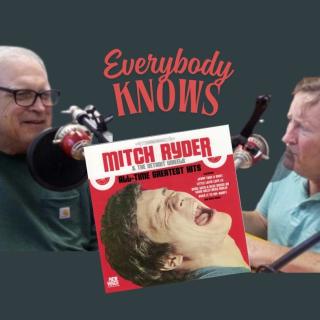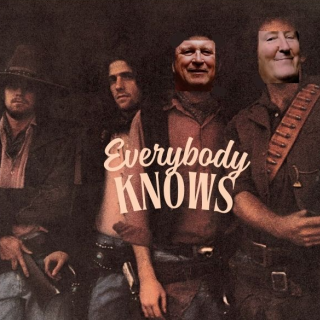How does one re-acclimate to America after spending time in a lovely war zone like the Helmand Province in Afghanistan? Exactly what is the first step to fitting back in the American comfort zone we all so secretly love?
After spending a few weeks a few years ago embedded with Marines in the Taliban's Heart of Dixie, I came home late one hot muggy August night. It was weird. Columbus was dead quiet. My house was fine and apparently hadn't even noticed I was gone. I dumped my gear in the dining room, walked into the living room and plopped down on the couch, feeling inside like a fat old dazed bullfrog staring at his stagnant algae-covered pond, unable to comprehend emotional reality.
It was like I had gone back in time to the year 1000 and now I was back in the 21st century. Talk about Stanley Kubrick's 2001: A Space Odyssey. I'd been a stranger in a strange land and now I felt a stranger in my own country and what's worse, on a couch that didn't seem to have missed me at all.
I sat for a while studying my DVD collection. Of course it was going to be by television that I re-immersed myself. It just wasn't going to be by watching Channel 10 or, heaven forbid, The History Channel--I'd seen enough history and you can have it. What I needed was a major dose of the best of Western culture to decompress. But how, for heaven's sake? And then it came to me.
The Beatles, baby! The magnificent Fab Four! Their gently riotous, charming 1965 film, Help! was the cultural antidote. I picked it because seeing John, Paul, George and Ringo being four happy-go-lucky brilliant musicians was the healthiest escape back to the earth I knew. Not until later did I realize the coincidence of the plot and my own circumstance: the lads were combating a death-dealing sacrificial eastern cult. I wasn't thinking that deeply that strange and lonesome night. I was just glad to be back, finally, after my trip into the heart of darkness. Yes, I felt like a Buckeye. Yay politically incorrect Notre Dame jokes!
Nowadays I have a sort of similar almost-daily ritual. After a hard day dealing with High Street trying to make ends meet in a record store slated for forced extinction, I once again turn to the Beatles for that something-deeper connection to reaffirm my musical humanity. Namely, reading The Beatles Anthology, a huge, heavy coffee-table book richly illustrated with hundreds of rare photographs accompanied with in-depth candid interview quotes from Beatles and their associates chronologically telling their experience. I've learned a lot.
I did not know Ringo was not drumming on the Beatles first single, Love Me Do (producer George Martin didn't think he was good enough). Martin was still pressuring the Beatles to record Mitch Murray's How Do You Do It, predicting it'd be a Number One. They hated it, but recorded it and then rebelled and insisted on being their own songwriters. Gerry and the Pacemakers had a number one with their arrangement. Shortly afterward, the Beatles first song to go to Number One was Please Please Me, which John and Paul had been working on for some time not quite getting it perfect until Martin suggested to Paul a different tempo.
"What's a tempo?" the musically unschooled genius asked the powerful producer in complete seriousness. But they sped it up and thus started their unbroken string of Number Ones. Ringo: "After that every bloody thing we did was Number One and it got strange because in a weird way we were waiting for the one that wasn't Number One. And when that happened we felt, 'Thank God that's over.' It was a lot of pressure: we had a dozen in a row that went Number One, so the one that didn't was a real relief."
Which one was the one that didn't, Beatles fans?
Their entire first album was recorded in a day--do you believe it? Pretty much it was the best of their live show. The book also goes into some great detail on how important their time in Hamburg was, playing several shows daily, often with terribly brutal fighting going on between the drunks (often British servicemen) and the gangster-like bar-help. When they graduated from pubs and clubs to halls and theater back home, no venues had more than two mikes and many had just one. Primitive times, truly.
John as a writer took inspiration from everywhere. Do You Want To Know A Secret came from him and his new wife Cyn being loaned the use of Brian Epstein's secret apartment for his gay sexual liaisons, John not going any farther outing Brian than the song title. Lennon also discusses Epstein being in love with him and his own possible gayness. Suffice it to say, John puts the kibosh on that rumor. Epstein as a businessman didn't impress George: "Brian didn't get very good deals on anything. For years EMI were giving us one old penny between us for every single and two shillings for every album. And there was the fiasco where Brian's father gave away the rights to The Beatles merchandising." The Beatles weren't even properly told that having their songs published meant they were giving away ownership. "I mean, that was terrible theft," said Harrison. "Things like that went on all the time."
The Beatles were in awe of Roy Orbison whom they once played second fiddle to on tour but eventually found themselves headlining with the magnificent Orbison preceding. George: "Roy would be out there every night and at the end he'd be singing, 'She's walking back to me, do do do do da do do do...'And the audience would go wild. We'd be waiting there and he'd do another big encore and we'd be thinking, 'How are we going to follow this?' It was really serious stuff."
So you get the idea. The big book is beautifully annotated, well-organized yet very casual. Still, it's the details of the greatest quartet in musical history. Paul growing up near a part of town where outdoor religious and political debates were held. A picture of John in his suspenders making tea in a tiny British kitchen, not even 20, his hair Elvis-like. The despair they genuinely felt firing Pete Best. The real contribution of original bassist Stu Sutcliffe and his tragic passing. Besides possessing culture-changing talent, the Beatles also, back then, anyway, possessed qualities of innocence and honesty. Indeed, despite the seediness of Hamburg, the post-war cultures of Britain and America were just beginning to rear back and charge into the consumer-dominated future head-on, a spreading of wealth, materialism and the good life the likes of which the world has never seen.
And The Beatles were consumed, weren't they? Or more like we grafted them on to ourselves and we morphed together. Reading this for 20 minutes a night tells me a lot about our lives in this part of the world. What, exactly, I'm not always sure. But it is precious and I can't imagine life without th



